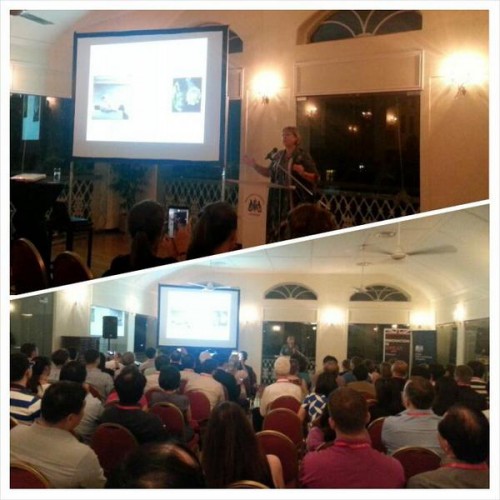5th December 2014 Singapore
The Importance of Web Science
In November we hosted a Distinguished Visitor Lecture by Dame Wendy Hall at the High Commissioner’s residence, Eden Hall. Anna Weston, a PhD student at the Web Science Centre for Doctoral Training at the University of Southampton, kindly wrote a guest post about the event and the importance of web science:
“From the beginning, Sir Tim Berners-Lee’s envisioned the World Wide Web as a hypertext/hypermedia system built upon the Internet architecture, which was open and free to all. He proposed this to his bosses at CERN in a paper called “Information Management: A Proposal”, to convince them of the viability of such a system. This original document included concepts such as linking documents, html and linked data. Furthermore Tim Berners-Lee advocated the importance of the network effect in the Web; it would only work if everyone used it. We would be living in a very different society if he had decided to commercialise the Web.
Over the past 25 years, the World Wide Web has grown and developed as a result of its mutually evolving relationship within society. Several milestones have significantly impacted this evolution, such as Google and Wikipedia. Google provided a way to intelligently search content on the Web. Wikipedia has become an online resource providing knowledge for all, which is updated and edited in real-time.
More recently there has been a move towards linked data and Web 3.0 (Semantic Web). The concept of Web 3.0 aims to build intelligent links between data, giving it context and meaning to both humans and machines. Web 3.0 relies on individuals, organisations and communities to put their data on the Web (Web 3.0 by Tim Berners-Lee). However, there are concerns surrounding this vision, especially relating to trust, openness and privacy. It is therefore important to consider the Web as socio-technical system, a machine in a social context and what impact it has.
Last week, I was honoured to attend a lecture at Eden Hall, the residence of the British High Commissioner. The venue was spectacular and fitting for the high-powered individuals from government, industry and academia who were present. After some drinks and appetisers we were invited upstairs to hear Professor Dame Wendy Hall give a lecture on “The Importance of Web Science”.
The study of Web Science aims to provide an interdisciplinary understanding of the Web phenomenon. The Web belongs to everyone and as a society we need to ensure the free and open Web works for and not against humanity. To learn more about the study of Web Science, take a look at the Web Science MOOC run by the University of Southampton.
The Web Science Trust (WST) aims to support global collaboration within the Web Science field. To this end, the WST maintains a network of (currently) 15 laboratories known as the WSTnet. The WST also maintains the Web Observatory which collates the resources and data from the 15 laboratories and other existing partners such as W3C. This system aims to support Web Science research.
This lecture was part of a workshop to prepare for the Web Science & Big Data Analytics Summer School at NUS in December. This Summer School is open to anyone who is interested in big data analytics and the Web. Wendy Hall’s talk covered the brief history of the Web and the need for an interdisciplinary approach to research. She ended by highlighting some of the challenges which society and the Web will face in the future, including net neutrality, cybersecurity, and trust. The Web is a fantastic phenomenon and we need to ensure it remains a space where people want to be and which benefits us all.”
Thanks to Anna Weston for this guest blog.
